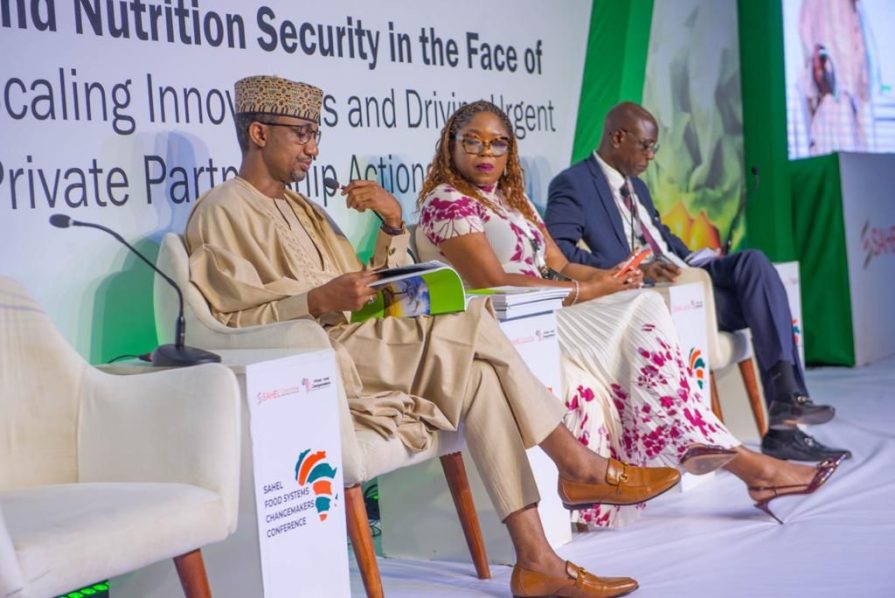
Sahel Consulting Agriculture and Nutrition Limited has stated that there is a need for increased investment in sustainable agriculture and rural development in order to end hunger once and for all.
This was disclosed at the Sahel Food Systems Changemakers Conference convened by Sahel Consulting in Abuja.
The Director General and CEO of NiMET, Prof. Mansur Matazu and Dr Sanjo Faniran of UN Food System, discussed these issues extensively in a session facilitated by Oge Funlola Modie.
They stated that Nigeria was facing unprecedented challenges as a result of irregular and increasingly harsh weather patterns that disrupt the typical agricultural cycle. Others are unpredictable rains, extended droughts and severe floods have become increasingly common, posing a danger to crop output and the well-being of farming communities.
These say said, have resulted in a never-ending cycle of crop failures and food insecurity, noting that farmers are left in a precarious position as they figure out when to sow, irrigate, fertilize and harvest their crops.
“These challenges affect not only crops but also livestock productivity, disrupting the nation’s food supply chain and increasing the cost of food”, they said.
The Nigerian Meteorological Agency (NiMet) being among the oldest public institutions in the country has the critical responsibility of providing meteorological information to the Government and citizens through forecasts and warnings for prompt early action by actors and the socio-economic impact of weather and climate changes across different government sectors as the importance of agro-meteorology to sustained agricultural productivity and public safety cannot be overemphasized.
“Incorporating climate advisory into farming has proven to increase yield by approximately 30 per cent and reduce risk. Indeed, a key factor in the mitigation of climate change-induced disasters is early warning advisory to smallholder farmers- and here lies the challenge for Nigeria.
“NiMET generates and analyses frequent weather and climate data and has developed numerous products for real-time weather and climate services to farmers, herders, and fishermen to promote sustainable agricultural development, increase productivity, and contribute to food security in Nigeria”, added.
Although donor-funded programs that support the integration of weather and climate early warning advisory into smallholder farming operations exist, these are not at scale and are limited to project focus areas and priority value chains. In addition, the Agri-Extension package in Nigeria does not include weather and climate advisory.
Coupled with the crippling shortage of extension agents in Nigeria, this creates a hopeless situation where smallholder farmers in hard-to-reach areas have no chance of getting this critical information.
Recommendations made to correct this include integration of weather and climate advisory systems into the sub-national level. They noted that so far, early warning efforts in Nigeria have been concentrated at the federal level.
Therefore, state and local governments must invest in efforts and partnerships to downscale seasonal climate prediction information to the district levels where it is most needed.
“For optimal implementation, local actors must be involved to ensure ownership, resilience, and sustained adoption at the grassroots level.
“Collaborating with existing farmer networks to further drive last-mile dissemination of essential weather and climate advisory services, NiMET must partner with farmer and industry associations like the All-Farmers Association of Nigeria and the Nigeria Agribusiness group to reach smallholder farmers at scale. “These organizations can potentially provide an organized way to reach farmers at the local and district level with targeted information.
“There should be a creation of strategic partnerships with the Nigerian Communications Commission (NCC) and Telecommunication Companies as well as fostering Strategic partnerships between NiMet and the NCC and private telecommunication companies to support the creation of affordable and accessible information delivery systems through SMS and USSD codes.
“This will aid the creation of a standardized alerting protocol for early warning that will support smallholder rural farmers and SMEs with credible information.
“The challenges facing the Nigerian food and agriculture sector due to climate change are undeniable. To ensure food security, maintain economic stability and uplift millions of livelihoods, Nigeria must embrace modern weather early warning systems at all levels.
“With a dedicated approach and investments in these systems, the nation can provide farmers with the tools and information they need to navigate the uncertain climate future, securing a brighter agricultural landscape for all.”






